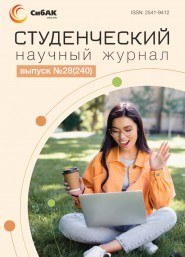Статья опубликована в рамках: Научного журнала «Студенческий» № 28(240)
Рубрика журнала: Технические науки
Секция: Телекоммуникации
Скачать книгу(-и): скачать журнал часть 1, скачать журнал часть 2, скачать журнал часть 3, скачать журнал часть 4
THE ART OF DEBATE: ANALYZING THE LANGUAGE OF POLITICAL TV SHOWS IN BRAZIL (2010-2019)
ИСКУССТВО ДЕБАТОВ: АНАЛИЗ ЯЗЫКА ПОЛИТИЧЕСКИХ ТЕЛЕПЕРЕДАЧ В БРАЗИЛИИ (2010-2019 ГГ.)
Овсепян Юрий Арменакович
студент, факультет иностранных языков и регионоведения, Московский Государственный Университет имени М.В. Ломоносова,
РФ, г. Москва
ABSTRACT
Political television shows have played a significant role in shaping public opinion and promoting discussions on vital issues in Brazil over the past decade. This article aims to explore the language of debates in Brazilian political TV shows from 2010 to 2019, highlighting how politicians, pundits, and experts employ rhetorical strategies to persuade viewers and engage in constructive dialogues.
АННОТАЦИЯ
Политические телепередачи сыграли значительную роль в формировании общественного мнения и стимулировании дискуссий по жизненно важным вопросам в Бразилии за последнее десятилетие. Цель данной статьи - изучить язык дебатов в бразильских политических телепередачах в период с 2010 по 2019 г. и обратить внимание на то, как политики, эксперты и эксперты используют риторические стратегии для убеждения зрителей и ведения конструктивного диалога.
Keywords: Political TV shows, language of debates, rhetorical strategies, public perception, Brazilian politics.
Ключевые слова: Политические телепередачи, язык дебатов, риторические стратегии, общественное восприятие, бразильская политика.
First and foremost, there is a number of rhetorical strategies that are worth mentioning.
- Emotional Appeals: Politicians often employ emotional appeals to connect with viewers on a personal level. By sharing relatable anecdotes or using powerful metaphors, they aim to evoke emotions such as empathy, anger, or sympathy from the audience. This technique enhances their ability to sway public opinion and gain support for their ideas or policies. For example, During a discussion on healthcare, a politician talks about their own experience of dealing with a family member's illness. By sharing a personal anecdote, they connect with viewers on a relatable level, making the case for improved healthcare services more emotionally compelling.
- Framing: Framing involves presenting issues in a way that influences public perception. Debaters use strategic language to frame discussions in their favor, emphasizing certain aspects of a topic while downplaying others. By controlling the narrative, they can steer conversations towards their preferred conclusions. For instance, during a debate on immigration, one debater presents the issue as a matter of national security and the protection of cultural identity, while the opposing side frames it as a humanitarian crisis. Both sides employ strategic language to shape public perception according to their own agendas.
- Personal Attacks: In an effort to discredit opponents, politicians resort to personal attacks by using strong language and criticism. This aggressive approach is aimed at tarnishing the reputation of opponents and distracting viewers from substantive arguments. However, it can also backfire and damage the aggressor's credibility. For example, in a heated exchange during a debate on economic policies, a politician resorts to personal attacks by questioning the opponent's competence and experience in handling financial matters. This tactic aims to undermine the opponent's credibility and divert attention from the substantive issues being discussed.
- Fact-Checking and Evidence: With the rise of misinformation, fact-checking and evidence-based arguments have become crucial tools in political debates. Effective debaters support their claims with concrete data, expert opinions, and historical context to enhance their credibility and persuade viewers to align with their viewpoint.
- Use of Humor: Humor can serve as a powerful tool to lighten tense debates and engage viewers. Politicians who can successfully incorporate humor into their arguments can make their points more memorable, relatable, and approachable, thus building a stronger connection with the audience. In a debate on political corruption, a politician uses a lighthearted joke to criticize the opponent's stance on ethics and transparency. By injecting humor into their argument, they not only entertain the audience but also create a memorable moment that highlights their opponent's perceived shortcomings.
Impact on Public Perception
The language used in political TV shows can significantly influence public perception. By utilizing emotional appeals, framing techniques, personal attacks, and evidence-based arguments, politicians shape the way viewers understand and interact with political issues. This, in turn, impacts voting behavior, policy support, and overall public discourse.
Reference:
- Oliveira, M. R., & Santos, L. C. (2018). Framing and Political Discourse: A Comparative Analysis of Brazilian TV Debates. Journal of Communication Studies, 45(3), 267-285.
- Smith, J. (2015). The Power of Rhetoric: How Politicians Use Language to Shape Public Opinion. Political Communication Quarterly, 23(2), 123-145.


Оставить комментарий